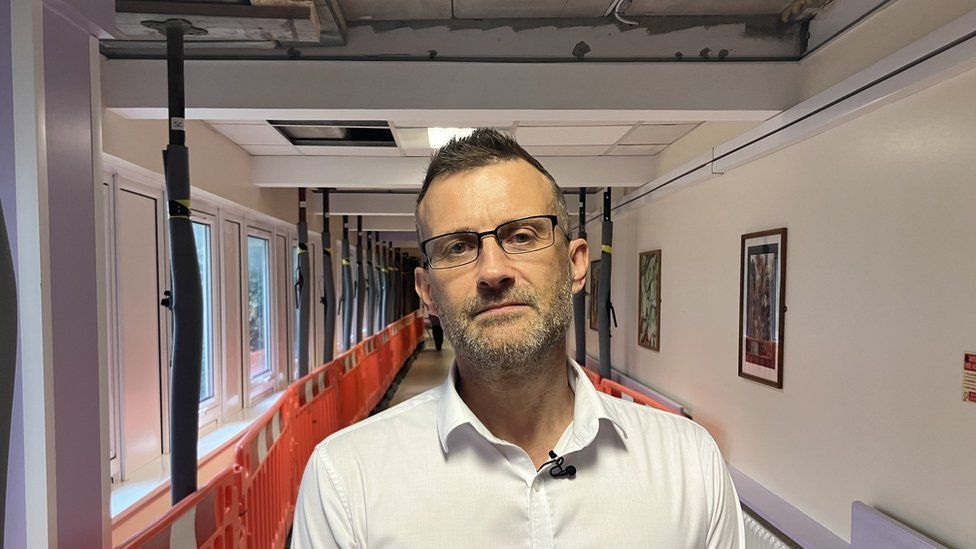ARTICLE AD BOX
 Image source, Alamy
Image source, Alamy
Steve Moore says the hospital only has 50% of its beds due to the closures
A hospital will be partially closed for most of next year after the discovery of crumbling concrete.
Withybush Hospital in Pembrokeshire has lost 50% of its beds according to the chief executive.
Reinforced autoclaved aerated concrete, or Raac, was used mostly in flat roofing between 1950s and 1990s as a cheaper alternative to concrete, but has a lifespan of 30 years.
Affected patients have been moved or discharged.
Six wards on the second floor of the 12-ward hospital have shut because of the amount of Raac found.
Other affected areas, including parts of the first floor and kitchen, had metal props to support the ceiling.
The physiotherapy ward was one of the wards that was able to reopen after closing last month, but staff must work around metal props.
Steve Moore, chief executive of Hywel Dda Health Board, said he was concerned about winter pressures.
'Really difficult time'
"We've probably lost about 50% of our beds so it is a worry," he said. "As we go into the winter we're going to see increases of demand at our front doors."
He said plans are in place but it will be "a really difficult time".
"Our job now is to try and, as quickly as possible, fix the areas that we've got these critical issues in so that we can start to reopen wards.
"The first ward should reopen at the end of September with patients hopefully coming back at the beginning of October.
"It does feel like things will start to gradually get better but we'll be fixing this issue for probably most of next year," Mr Moore said.
Metal props support the ceiling in parts of the hospital
According to the health board, the props will be in place until April next year.
Most patients have been moved 12 miles (19 km) away to South Pembrokeshire hospital, or about a half-hour drive.
Some planned surgeries have been moved a two-hour drive away to Bronglais Hospital in Aberystwyth, 68 miles (109 km) from Withybush.
Mr Moore called it a "quite a worrying time" for patients.
"Of course, the environment is not ideal, and we've had to move some beds out of some areas and into others that are not entirely suitable."
"I would like to apologise to some patients who are experiencing that."
The Welsh government has given the health board £13m for repairs, but experts say that Raac will need to be replaced completely due to its fragility.
Ward closures mean staff are concerned about the winder pressures as they will be working at a lower capacity
Mr Moore said this funding was not enough to offer a long-term solution. "It will absolutely deal with the short-term issue so it will make the hospital safe and that will ensure that people are safe."
"We've got low-risk areas that we'll have to continue to check every year. What we know about this material is that it can become high risk very quickly and unpredictably. So there's likely going to be need for ongoing repair for the next few years."
Last week the health board held a public meeting to discuss potential sites for a new hospital in west Wales.
The new hospital is due to open in 2029.
Mr Moore said the current Raac situation emphasised the need to make the new hospital plans a priority.
"There will be ongoing disruption going on at Withybush for many years. But I think that underlines the need for getting on with building this new hospital."
Tim Griffiths says it has been hard to get the message across to patients that the hospital cannot deliver the therapy it wants to
Tim Griffiths, the lead physiotherapist for acute and community services in Pembrokeshire, said it had not been an easy time for staff.
"I think it's trying to get the understanding [to the patients] that we can't quite deliver the therapy that we'd want us to deliver.
"That's hard for people because they deserve to have the best possible standard of care. But we've got to have those conversations that we haven't got the resources that we should have."
The Welsh government said that it will continue to work with the health board to mitigate the risks of Raac at Withybush, to ensure the site is safe for patients, staff and visitors.

 1 year ago
45
1 year ago
45








 English (US) ·
English (US) ·